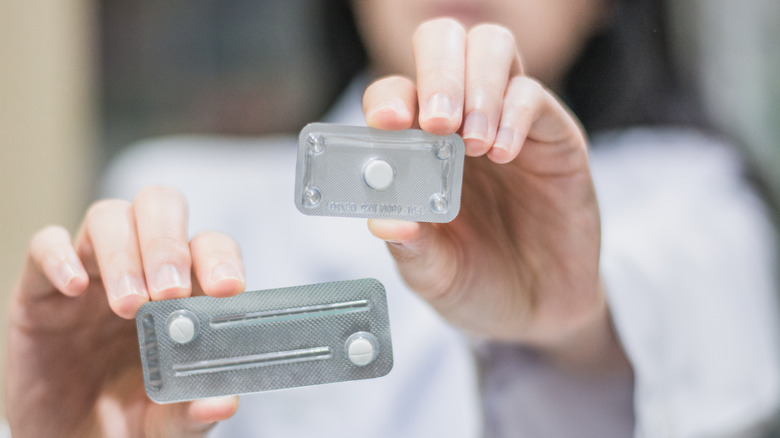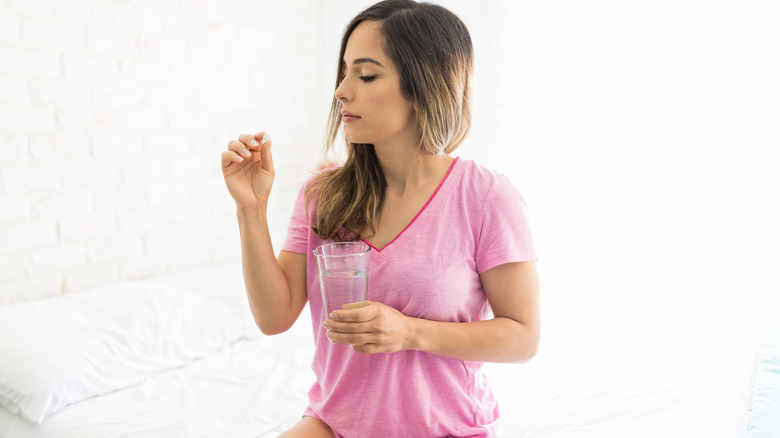How To Increase The Effectiveness Of The Morning-After Pill
The morning-after pill is a form of emergency contraception following unprotected sex or sex where another form of contraception proved ineffective; for example, if the condom broke or if you missed your daily dose of birth control that day. There are two kinds of morning-after pill. One has ulipristal acetate and goes by the brand name ella, and requires a prescription. The second has levonorgestrel and is sold under several different brand names, including Plan B One Step and Preventeza, among others. These are often sold over the counter and come in either one- or two-pill forms.
It's worth mentioning that IUDs are another form of emergency contraception, like Paragard, Mirena, and Liletta, but they must be inserted within five days of unprotected sex to work as emergency contraception and the procedure must be completed by a nurse or doctor.
The morning-after pill does not stop a pregnancy once it's taken place; it's not the same as an abortion pill. It works by delaying ovulation, in other words, temporarily stopping the ovary from releasing an egg. The morning-after pill reduces the risk of pregnancy by roughly 75%, according to Yale University, and so while it's proven to be a very effective backup form of contraception, there are a few things worth noting to ensure its efficacy.
When to take the morning-after pill
Timing is everything with the morning-after pill, and it is best to take it as quickly as possible. If taking the pill ella, you have a five-day window in which to take it after unprotected sex, according to Planned Parenthood. Meanwhile, if you're taking a pill with levonorgestrel, like Plan B One Step, you can also take it within five days of unprotected sex, but it works best if taken within 72 hours. Plan B comes as a single tablet, but options like Next Choice have two tablets, which can be taken at the same time or 12 hours apart. As Planned Parenthood notes, ella is a more effective morning-after pill than ones with levonorgestrel, regardless of the window in which you take them.
Since nausea is a common side effect of the morning-after pill, it's safe to take with food, according to Yale University. If you throw up after taking the morning-after pill, contact your healthcare provider to see about getting another prescription, as it's possible your body didn't effectively absorb the pill. If nausea is an issue, your healthcare provider may also suggest an anti-nausea medication that is safe to pair with the morning-after pill, Yale University notes.
Sex after the morning-after pill, and other factors
To ensure the efficacy of the morning-after pill, be mindful about having sex after taking it. Don't assume that the morning-after pill will offer blanket protection after taking the pill. Sperm can potentially live inside the body longer than the window of protection offered by emergency contraception. It's simply not as effective as birth control and should only be used after unprotected sex. Dr. Raegan McDonald-Mosley told Seventeen that in the four-day window following the morning-after pill, it's wise to use a condom as backup protection, even if you're on the pill.
There are a few other important things to take into account. Be cautious about certain medications, as they can impede the efficacy of emergency contraception. According to GoodRx Health, some antibiotics and some anti-seizure medications can reduce the effectiveness of the morning-after pill. The supplement St. John's wort can also reduce its efficacy.
There's one other thing to note. Weight can impact the effectiveness of the morning-after pill. As Planned Parenthood notes, for women weighing over 195 pounds, ella doesn't work as well, and for women over 165 pounds, pills containing levonorgestrel don't work as well. However, if that's the only option available, there's still some efficacy. "I certainly don't think that you shouldn't take Plan B if that's what you have access to," Dr. Anne Davis told Self. In cases such as these, it's definitely worth speaking to a healthcare provider.


